Education Health & Wellness
Homeless students lose resources during summer break. Who’s filling the gap?
The fire was out of control by the time they heard loud popping noises from the garage.
Education Sponsor
Education stories are made possible in part by Tacoma Community College, a proud sponsor of Gig Harbor Now.
The VanderDoes family of five grabbed their pets — two Australian shepherd puppies and a bearded dragon named Scooter — and ran outside.
“It was hard because my whole safe place and everything I knew, just in a heartbeat was …,” said Aleah, 16, oldest of three kids, as she recalled the night in February when they lost their Key Peninsula home. “Just watching it go and not being able to do anything about it. And just like, I don’t know, I think I’m still in shock with what happened, and I haven’t really processed it yet.”
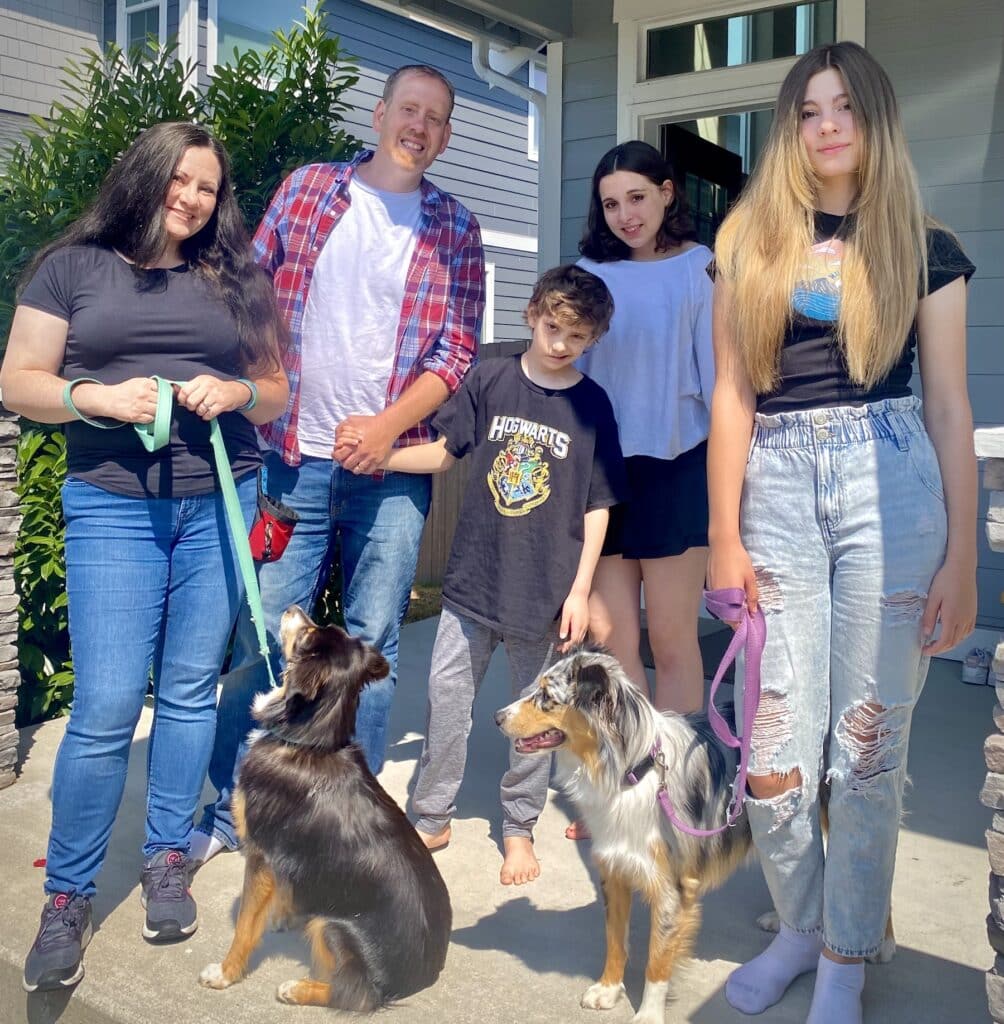
The VanderDoes family lost their Key Peninsula home in a fire in February. Mom Amy VanderDoes, left, says counselors at the children’s schools helped them process the trauma. Transportation assistance from Peninsula School District, one of a number of services offered to homeless students, has helped with logistics of getting the kids to and from school. The family’s temporary home is outside district boundaries in Bremerton. From left: Amy, Dad Martin, Brayden 9, who is battling brain cancer, Aleah, 16, and Kaylee, 13. Their dogs are Hope (left) and Nala.
Within minutes, neighbors came out to help. One woman even gave dad Martin her shoes as he was standing in soaking wet socks. Members of their church rallied around them in the those first few days, when they were put up at a Gig Harbor hotel.
Peninsula schools also provided help in the immediate aftermath of the fire and throughout the school year. The family received clothing, gas cards, food and a replacement for Aleah’s Chromebook. School counselors provided ongoing emotional support for Aleah, who attends Peninsula High School, her sister Kaylee, 13, at Key Peninsula Middle School, and brother Brayden, 9, at Evergreen Elementary. That support was invaluable as the now-homeless family struggled to put their lives back together, said mom Amy VanderDoes.
Stability amid chaos
During the 2022-23 school year, 225 students within Peninsula School District were designated as homeless, lacking “fixed, regular and adequate accommodations.” For most, that means “doubling up” with others in a household, couch-surfing, living in a teen shelter or host home, or temporarily staying with a relative or other adult because a parent or guardian is unable to care for them. Others may be living in a car or RV, staying in a campground or finding shelter in a substandard structure like a shed.
Homeless students’ daily lives are fraught with uncertainty and logistical challenges that interfere with healthy development, including education. The McKinney-Vento Homeless Education Assistance Act, passed in 1987 and reauthorized in 2002 as part of No Child Left Behind, requires schools to identify and assist homeless students. That’s something Peninsula schools would do even if it wasn’t a federal requirement, said Becky Maffei, the district’s lead counselor.
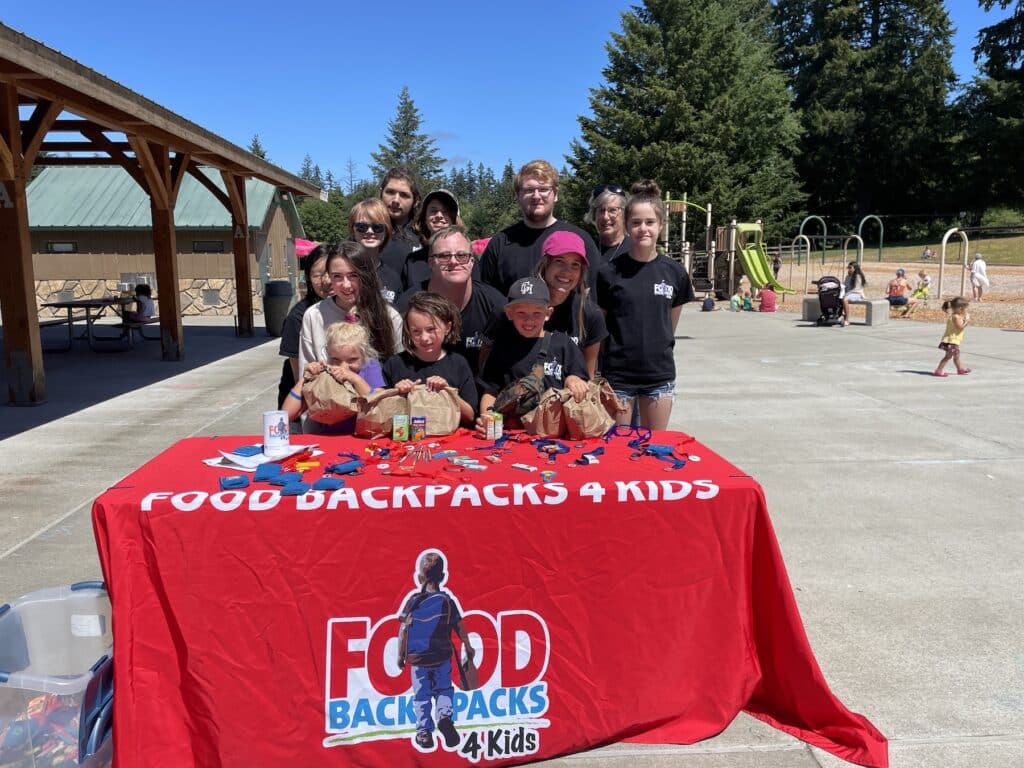
Food Backpacks 4 Kids serves free Lunch in the Park for students during the summer to help fill the gap for students who rely on meals provided by schools. There are four meal site locations, two in Gig Harbor, two on Key Peninsula. The summer meal program runs July 11 through Aug. 31.
Under McKinney-Vento, the district connects students and their families with resources such as housing placement and other social services. Homeless students receive free meals, and they get transportation to and from their home school, regardless of where they’re staying.
School counselors and others, like Communities in Schools staff who partner with the district, keep tabs on homeless students and work to meet their needs, whatever those may be day by day.
Filling the summer break gap
When summer break comes, that connection with schools is disrupted, leaving homeless students potentially adrift. District liaisons for homeless students at each school contact families before school lets out to try and fill the gaps, Maffei said.
“What happens over the summer in a lot of cases is they don’t have as ready access to resources that they had through school, and so one of the things that we try to do is connect students with programs over the summer,” said Maffei. “As a school district, we can say, hey, here’s a program that could be really great for your kid this summer, and we can help you get a scholarship.”
That could mean summer activities through PenMet Parks, summer camps through the YMCA, or the district’s own summer school programs. In addition, the district partners with Right at School to host a summer camp at Pioneer Elementary.
Summer meal program starts
Two of the biggest challenges for homeless students, especially during the summer, are food and transportation. The two are intertwined.
Unlike many districts, Peninsula School District does not participate in federally funded summer meals, an extension of the National School Lunch program.
Filling the gap is Food Backpacks 4 Kids, a local nonprofit that provides backpacks of food for students in need during the school year to supplement school meals. During the summer, FB4K serves twice-weekly nutritious sack lunches at four strategic locations, two on Key Peninsula, two in Gig Harbor.
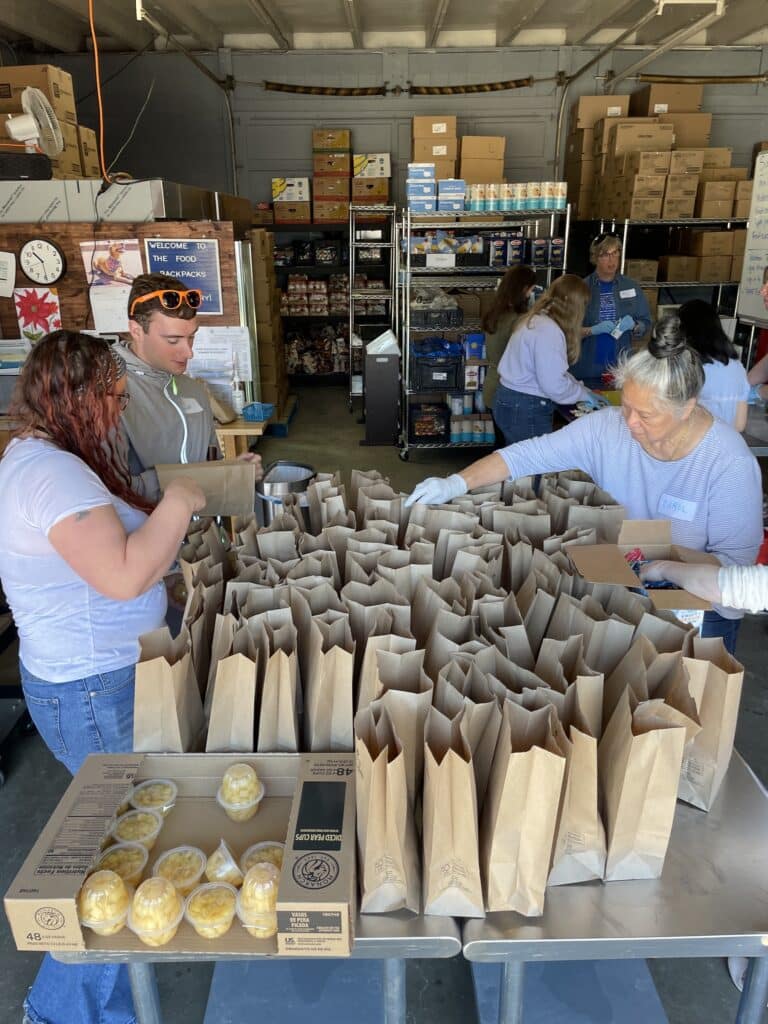
Food Backpacks 4 Kids serves free Lunch in the Park for students during the summer to help fill the gap for students who rely on meals provided by schools. There are four meal site locations, two in Gig Harbor, two on Key Peninsula. The summer meal program runs July 11 through Aug. 31.
The organization also operates a Family Pantry in Key Center with both perishable and non-perishable items, and delivers food directly to families and individuals as needed.
FB4K’s Lunch in the Park Program is heavily used, with 2,000 lunches served last year. It’s the only free summer meal program for youth in the area, said spokeswoman Michelle Johnson.
“Everybody loves summer, but we feel that pain,” Johnson said. “How are these kids going to get food if their families aren’t already coming to the Family Pantry and their families are relying on lunches at the schools? Now that’s gone.”
The summer lunch program is not exclusively for homeless students. All children and youth are welcome. And, like FB4K’s other services, no sign-up or proof of income is required. Just show up and eat.
New meal locations added
Keeping track of homeless students over the summer is a challenge, Johnson said. “It’s really difficult once school is out, to have that connection.”
Two new summer lunch locations have been added this year with the goal of bringing services to where students are. In addition to Gateway Park in Gig Harbor and Home Park on the Key Peninsula, lunches will be served at Gig Harbor Skate Park and Key Peninsula Civic Center.
The skate park ticked all the boxes as a location that addresses students’ transportation issues, Johnson said.
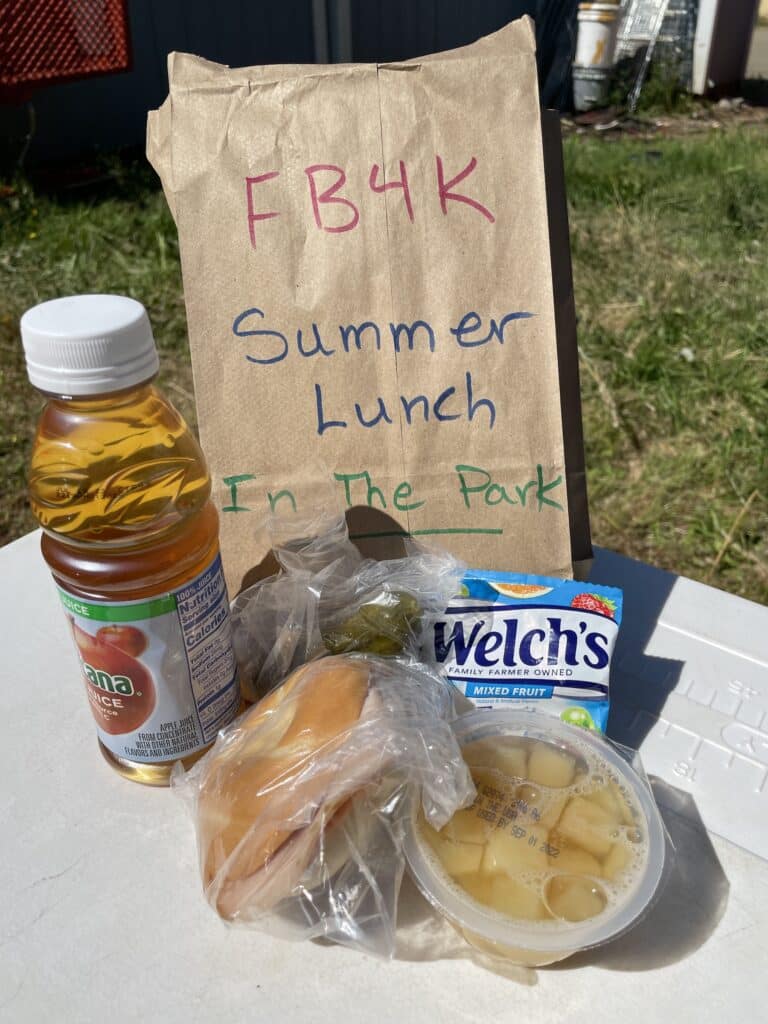
Food Backpacks 4 Kids serves free Lunch in the Park for students during the summer to help fill the gap for students who rely on meals provided by schools. There are four meal site locations, two in Gig Harbor, two on Key Peninsula. The summer meal program runs July 11 through Aug. 31.
“It’s difficult because where do you find places where the kids are?” she said. “So (the skatepark) is a perfect location for us because it’s a park that kids come to that’s right near an apartment complex on a bus line.”
FB4K is partnering for summer meals with Children’s Home Society, which offers services at the KP Civic Center to youth and families, including mentoring, basic needs and referrals.
The summer lunch program starts Tuesday (July 11) and runs through Aug. 31. Meals are served from noon to 1 p.m. Tuesdays and Thursdays at all locations.
FB4K relies largely on volunteers to run its programs. The organization is looking for middle school students age 12 and older and high school students to volunteer making lunches. Johnson said it’s an opportunity for youth to help others while gaining valuable job skills. A food handler’s card is required.
“It’d be nice to have a good year”
Transportation was a big challenge for the VanderDoes family after they lost their home. Fortunately, their insurance pays for temporary housing while their home is getting rebuilt. Unfortunately, the home they’re in until “sometime next year” is in Bremerton, just over the South Kitsap border.
Peninsula School District works with neighboring districts to arrange transportation for students to their home schools. But that wasn’t working in this case. With three kids in three different schools, busing from outside the district was already looking complicated. In addition, Brayden has been receiving treatment for brain cancer since early 2022, and the ride to Evergreen Elementary would be just too long for him.
Fortunately, Amy VanderDoes works at Evergreen as a secretary so she could bring Brayden to school, and the district agreed to reimburse the family for transportation costs. The family got financial assistance for Brayden to attend the Boys & Girls Club at Evergreen before and after school. The district also offered flexibility for the girls’ schedules to accommodate the family’s transportation needs.
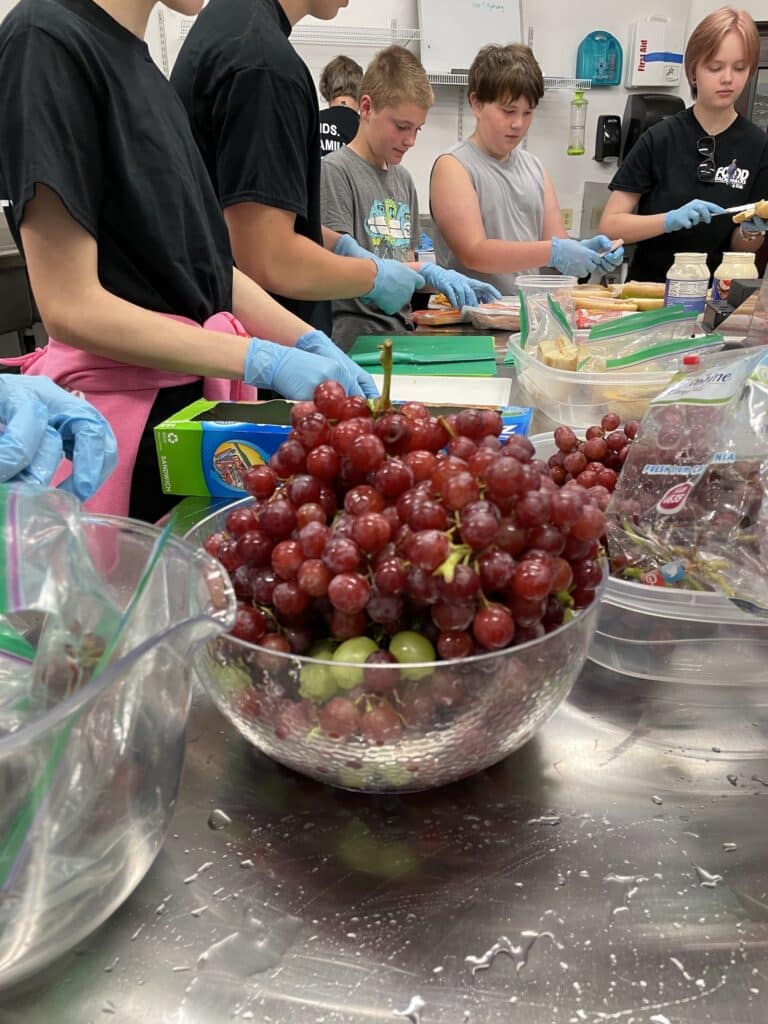
Food Backpacks 4 Kids serves free Lunch in the Park for students during the summer to help fill the gap for students who rely on meals provided by schools. There are four meal site locations, two in Gig Harbor, two on Key Peninsula. The summer meal program runs July 11 through Aug. 31.
Martin, a self-employed retirement planning advisor, has been the primary caregiver during Brayden’s illness. It was a “miracle” Amy landed her job with the school district and secured insurance just in time to cover the family’s steep medical bills, the couple says.
Brayden will complete chemotherapy this summer and is doing well. The family is looking forward to getting back in their own home sometime in 2024 and resuming a more normal life.
“It’d be nice to have a good year, but we’re getting there,” Martin said.
Food Backpacks 4 Kids Summer Resources
Summer Lunch: Free, nutritious sack lunches for children and youth; Tuesdays & Thursdays, noon to 1 p.m., July 11 through Aug. 31. Locations: Gateway Park, 10405 Highway 302, Gig Harbor; Gig Harbor Skate Park, 3510 Grandview St., Gig Harbor; Home Park, 17220 8th Avenue Ct, KPN; Key Peninsula Civic Center, 17010 S. Vaughn Road NW, Key Peninsula.
Family Pantry: Open noon to 6 p.m., Wednesdays, Thursdays and Fridays at Key Center, 9127 154th Avenue Ct. NW, Lakebay
Annual Clothing Giveaway: Clothing, shoes and accessories for children, youth and adults. Noon to 7 p.m. Aug. 25; 10 a.m. to 6 p.m. Aug. 26; 9 a.m. to noon Aug. 27. Location, Key Peninsula Civic Center, 17010 S. Vaughn Road, Vaughn. This is the fourth annual clothing giveaway. FB4K is accepting donations of new and gently used items.
Contact: (253) 857-7401; [email protected]
Info: foodbackpacks4kids.org
Other Resources
Gig Harbor Peninsula FISH Food Bank: 4303 Burnham Drive, Gig Harbor; (253) 858-6179; check website for operating hours, ghpfish.org.
Children’s Home Society: Promoting strong families by providing basic needs, mentoring and referrals (financial aid, health care, employments). Open 9 a.m. to 4:30 p.m. Monday through Friday at the Key Peninsula Civic Center, 17010 S. Vaughn Road, Vaughn; (253) 884-5433.
Harbor Hope Center: Providing homeless youth with transitional housing, mentoring, food and transportation; (844) 841-1954; [email protected].

